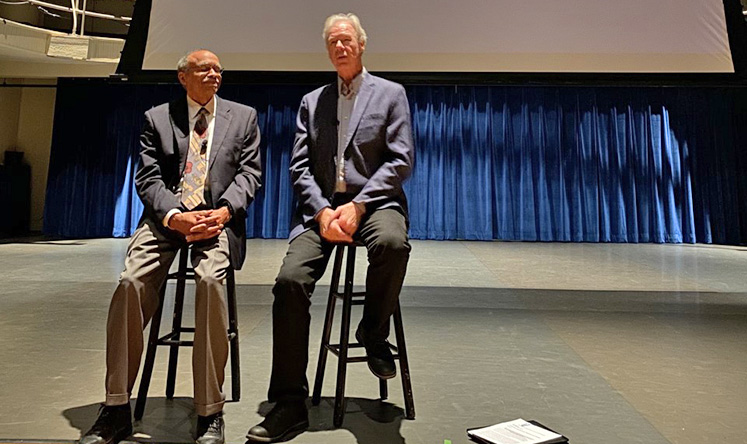About 100 students, faculty and staff, and a handful of community members packed into Williams Hall on Oct. 23 to view the film Backs Against the Wall: The Howard Thurman Story.
The film details the life of Howard Thurman, a grandson of slaves, who grew up in Florida and eventually went on to be an important nonviolent icon during the civil rights movement alongside the likes of Martin Luther King Jr. and Jesse Jackson.
David Gowler, Pierce Chair of Religion at Oxford, brought the film to campus as part of this year's Pierce Program in Religion. He co-edited a book on Thurman’s sermons.
“Thurman played a major role in providing, with influence from (Mahatma) Gandhi, as well as Jesus' teachings, the spiritual foundation for the civil rights movement, including being a mentor for Dr. King, Rev. Jackson and many others who studied and carried (his book) 'Jesus and the Disinherited' with them,” Gowler notes. “Thurman's vision reminds us that our actions must be built on a solid philosophical or religious foundation, which, for Thurman, was the actualization of the inner presence of God outwardly in one's words and deeds.”
The film chronicles Thurman's life, which started in the early 1900s in Daytona Beach, Fla. He grew up as a lonely and sensitive child – without a father at a young age and known for often talking to an oak tree – and didn't believe that you could only experience God at church. “Sometimes I think nobody cares,” he wrote at one point.
The movie includes commentary from Jackson, US Representative John Lewis, Oprah Winfrey, pastors, authors, professors, and other civil rights leaders. It also includes interviews with Luther E. Smith Jr., Emory’s Candler School of Theology professor emeritus of church and community, a Thurman biographer who helped lead a discussion following Oxford's screening.
“This film introduces current and coming generations to Thurman's legacy and how he is a resource to us now as we move forward,” Smith explains. “We can celebrate particularity in the community and appreciate the particularities of others.”
Although education after eighth grade was limited for black children at that time, Thurman went on to graduate from his hometown school and go on to the Florida Baptist Academy in Jacksonville, Fla. Later, he attended Atlanta’s Morehouse College alongside Martin Luther King Sr., Rochester Theological Seminary in New York as one of two black students accepted that year, and Haverford College near Philadelphia.
He went on to teach at Morehouse College, Howard University, and Boston University.
In his preaching services, Thurman often incorporated long periods of silence.
“Thurman reminds us that Jesus of Nazareth proclaimed a radical and dangerous message, and Thurman also warns us of the pervasive tendency of Christians to domesticate that radical message, to water it down or to ignore parts of it entirely, so that we can claim to be followers of Jesus when, in fact, we are not following his call for radical discipleship,” Gowler says.
In 1935-1936, Thurman and his wife traveled to Sri Lanka and India with another couple and met with another fellow nonviolent leader Gandhi. Then in San Francisco in the mid 1940s, Thurman helped start the Fellowship Church for All Peoples, a multiracial and interfaith church, a radical mission at the time.
“All these categories fade away to God,” Thurman says in the film. “Experiences of unity among people are more important … than concepts, ideologies, and faiths that may divide.”
Thurman often was called a “mystic” and criticized by many because he was not on the front lines of many of the marches held during that time, instead he provided a spiritual foundation and resource for other leaders who marched on the front lines.
“Some thought Howard Thurman was a saint and others thought there was something mystic about him,” Lewis says in the film.
Doblmeier even admitted that he struggled with the fact that Thurman was in the background a lot of the time.
“I saw his role as much of a social activist than any of them (on the front lines),” he notes, with Smith adding that people like Thurman should not be dismissed, as well as artists and others who were more in the background of the social movement.
Oxford was Doblmeier's 40th screening of the film, which also has been shown at other colleges and universities across the United States.
Doblmeier left students at the screening with a task – use the available resources in today's world to take on challenges, whether it be an environmental movement or otherwise.
“I hope you create the change that you want to see in the world,” he says, adding that he notices more of the younger generation taking risks and being more vocal than those who lived before them. “I think your time has come.”
Gowler co-edited a book, Howard Thurman: Sermons on the Parables with Morehouse Professor Kipton E. Jensen. Proceeds from the sale of the book go to the Howard Thurman Educational Trust at Morehouse College that was set up by the family in the 1970s to continue his legacy.

